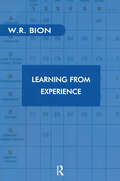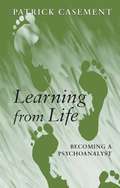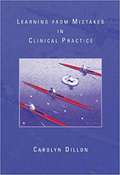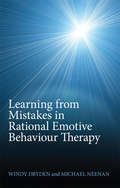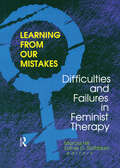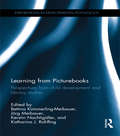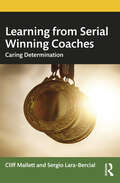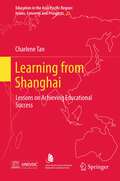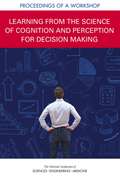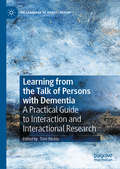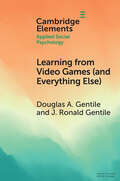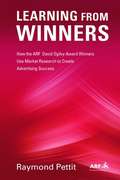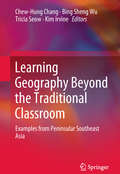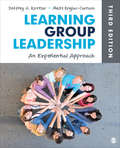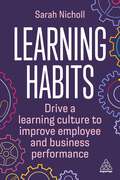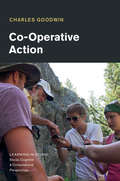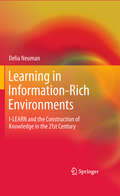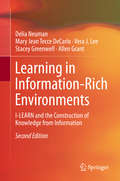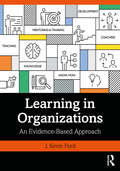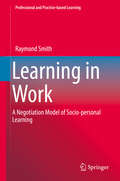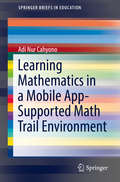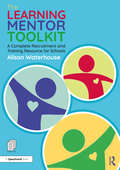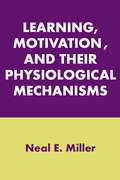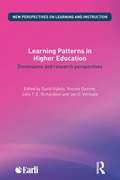- Table View
- List View
Learning from Experience
by Wilfred R. Bion'As the problems raised in this book are fundamental to learning they have a long history of investigation and discussion. In phsycho-analytical practice, particularly with patients displaying symptoms of disorders of thought, it becomes clear that psycho-analysis has added a dimension to problems if not to their solution. 'This book deals with emotional experiences that are directly related both to theories of knowledge and to clinical psycho-analysis, and that in the most practical manner.'- Wilfred R. Bion, from the Introduction. In this book Bion describes his use of the term "alpha-function" to conceptualize how the data of emotional experience is processed and digested. This includes his thinking on "contact barriers" and the bearing of "projective identification" on the genesis of thought.
Learning from Life: Becoming a Psychoanalyst
by Patrick CasementAll of life can be a resource for our learning. In his fourth and most personal book, Patrick Casement attempts to understand what he has learned from life, sharing a wide range of those experiences that have helped shape the analyst he has become. Patrick Casement shares various incidents in his life to demonstrate how these helped lay a foundation for his subsequent understanding of psychoanalysis. These examples from his life and work are powerful and at times very moving, but always filled with hope and compassion. This unique book gives a fascinating insight into fundamental questions concerning the acquisition of analytic wisdom and how personal experiences shape the analyst's approach to clinical work. It will be of great interest to all psychoanalysts and psychoanalytic psychotherapists.
Learning From Mistakes In Clinical Practice
by Carolyn DillonThis text is a virtual handbook of classic mistakes to anticipate, work through, and grow from. It identifies, discusses and re-frames classic mistakes that beginning interviewers and clinicians are likely to make in practice by illuminating a myriad of mistakes through the use of first-hand vignettes, in-text exercises, and a systems framework. This book uses a strengths-perspective, and can serve as a companion text or as a stand-alone primer because of its elaboration of the phases, principles, strategies and methods used in the helping process.
Learning from Mistakes in Rational Emotive Behaviour Therapy
by Windy Dryden Michael NeenanMistakes are often an inevitable part of training; Learning from Mistakes in Rational Emotive Behaviour Therapy encourages the trainee to pinpoint potential errors at the earliest possible stage in training, helping them to make fast progress towards becoming competent REBT practitioners. Windy Dryden and Michael Neenan have compiled 111 of the most common errors, explaining what has gone wrong and how to put it right, and have divided them into eight accessible parts: general mistakes assessment mistakes goal-setting mistakes disputing mistakes homework mistakes mistakes in dealing with client doubts and misconceptions working through mistakes self-maintenance. Learning from Mistakes in Rational Emotive Behaviour Therapy is an indispensable guide for anyone embarking on a career in the REBT field.
Learning from Our Mistakes: Difficulties and Failures in Feminist Therapy
by Esther D Rothblum Marcia HillIf you’re a long-time veteran of feminist therapy or someone just starting out, you’ll find a helpful, reliable list of “dos” and “don’ts” in Learning from Our Mistakes: Difficulties and Failures in Feminist Therapy. Frank and honest in tone, makeup, and style, this one-of-a-kind publication looks at the failures and roadblocks that have hampered feminist therapists in the past so you can learn from their misfortunes and avoid them in your own professional endeavors. In Learning from Our Mistakes, you’ll come face-to-face with classic difficult cases, and you’ll see from a feminist perspective how therapists used various treatments to deal with these seemingly insurmountable challenges. You’ll find that these and other topics will help you in navigating the difficult situations that arise in your personal practice: the pros and cons of terminating with a client who has an eroticized transference differences between therapists and clients in terms of race, ethnicity, and age problems encountered by rural therapists in small communities using a translator in therapy when the therapist and client don’t speak the same language feelings of anger in therapy many other “log jams” in the therapeutic processIt’s no mistake that Learning from Our Mistakes is full of what works and what doesn’t. In it, three veteran discussants give you the tools necessary to overcome the uncertainties and inadequacies that plague therapists. You’ll come away understanding the many ways failure is embedded in both the theory and practice of psychotherapy. Ultimately, you’ll find that mistakes are really only failure narratives waiting to be used, shaped, and turned toward the positive experiences of both client and therapist.
Learning from Picturebooks: Perspectives from child development and literacy studies (Explorations in Developmental Psychology)
by Bettina Kümmerling-Meibauer Jörg Meibauer Kerstin Nachtigäller Katharina J. RohlfingPicturebooks, understood as a series of meaningful text-picture relations, are increasingly acknowledged as an autonomous sub-genre of children’s literature. Being highly complex aesthetic products, their use is deeply embedded in specific situations of joint attention between a caregiver and a child. This volume focuses on the question of what children may learn from looking at picturebooks, whether printed in a book format, created in a digital format, or self-produced by educationalists and researchers.Interest in the relationship between cognitive processes and children’s literature is growing rapidly, and in this book, theoretical frameworks such as cognitive linguistics, cognitive narratology, cognitive poetics, and cognitive psychology, have been applied to the analysis of children’s literature. Chapters gather empirical research from the fields of literary studies, linguistics and cognitive psychology together for the first time to build a cohesive understanding of how picturebooks assist learning and development.International contributions explore: language acquisition the child’s cognitive development emotional development literary acquisition ("literary literacy") visual literacy. Divided into three parts considering symbol-based learning, co-constructed learning, and learning language skills, this cross-disciplinary volume will appeal to researchers, students and professionals engaged in children’s literature and literacy studies, as well as those from the fields of cognitive and developmental psychology, linguistics, and education.
Learning from Serial Winning Coaches: Caring Determination
by Cliff Mallett Sergio Lara-BercialLearning from Serial Winning Coaches provides performance coaches and directors, coach developers, and researchers with the knowledge and tools to affirm and challenge policy and practice and conduct further research to inform future policy and practice in the identification, recruitment, and development of performance coaches. Leading an athlete or team to an Olympic or world championship gold medal or professional league title is a great achievement for a coach; a dream that comes true for a small group of privileged coaches. This outstanding accomplishment can become the defining moment of their careers. Winning multiple golds and championships with different athletes or teams, and across multiple major events spanning decades, is the prerogative of an exclusive club of coaches. This book reveals the secrets, experiences, and practices of 17 of these coaches across 10 sports and 10 different countries. Through a combination of in-depth interviews with the coaches and their athletes and a detailed analysis of their personality and motivational profiles, Mallett and Lara-Bercial offer a unique portrait of the day-to-day workings of these coaches: who they are, how they operate, their leadership style, and their inimitable and often serendipitous journeys to the top of the sporting world. Learning from Serial Winning Coaches goes beyond the description of isolated coaching behaviours provided by previous research to explore the personal realities of these exceptional men and women, coaches, and athletes. The emerging multi-dimensional picture sheds light on the unique conditions and practices that lead to the unparalleled success of these true outliers. This book is key reading for researchers, coaching and coaching psychology students, performance coaches and directors, and coach developers, providing a novel evidence-based theoretical framework to conduct further research, shape and reshape coach development, and facilitate the identification and recruitment of the next generation of serial winners.
Learning from Shanghai: Lessons on Achieving Educational Success (Education in the Asia-Pacific Region: Issues, Concerns and Prospects #21)
by Charlene TanThe Shanghai school system has attracted worldwide attention since its impressive performance in the International Programme for Student Assessment (PISA) in 2009. The system ranks as a 'stunning success' according to standards of the Organisation for Economic Co-operation and Development (OECD). Shanghai also stands out for having the world's highest percentage of 'resilient students' - students from socio-economically disadvantaged backgrounds who emerge as top performers. Learning From Shanghai: Lessons on Educational Success offers a close-up view of the people and the policies that have achieved such world-class performance. Based on research and personal observation gathered during the author's recent field work with school principals, teachers and students, this book explores the factors that explain Shanghai's exceptional success in education. The approach combines high standards of scholarly research and analysis with the author's unique personal insights, as evidenced by chapters entitled Education is Filling a Bucket and Lighting a Fire and Tiger Mothers, Dragon Children. Drawing on her experience as an education professional and a teacher of teachers, Charlene Tan thoroughly examines and analyzes the people, the policies and the practices that distinguish Shanghai educators. The contents include comprehensive details on the Shanghai approach to quality education, from discussion of the balance between centralization and decentralization, to school autonomy and accountability, to testing policy and professional development for teachers. The book includes detailed tables on curriculum and school performance targets, sample appraisal forms for teachers and students, and dozens of photographs. The author is an Associate Professor at the National Institute of Education, Nanyang Technological University, Singapore.
Learning from the Science of Cognition and Perception for Decision Making: Proceedings Of A Workshop
by Engineering Medicine National Academies of SciencesBeginning in October 2017, the National Academies of Sciences, Engineering, and Medicine organized a set of workshops designed to gather information for the Decadal Survey of Social and Behavioral Sciences for Applications to National Security. The fourth workshop focused on the science of cognition and perception, and this publication summarizes the presentations and discussions from this workshop.
Learning from the Talk of Persons with Dementia: A Practical Guide to Interaction and Interactional Research (The Language of Mental Health)
by Trini StickleThis book offers an in depth analysis of the interactional challenges that arise due to various dementias and in a variety of social contexts. By assessing conversations between persons with dementia and their family members, caregivers, and clinicians, it shares insights into both the language and actions selected by the participants. Using several different research methods, authors highlight competencies and areas of struggle, as well as choices that ease interactions along with those that seem to complicate them. Each chapter provides practical strategies to help readers better navigate day-to-day interactions with persons with dementia. The book is part of a continuing effort to offer guidance and hope to those for whom such conversations have become part of their daily lives. It presents concrete recommendations for specific groups such as family members, caregivers, and clinicians; it will also be of interest to researchers in the field of dementia and early career scholars interested in the methodologies discussed.
Learning from Video Games: The General Learning Model (Elements in Applied Social Psychology)
by Douglas A. Gentile J. Ronald GentileVideo games can have many effects on players, some of which could be intentional effects (e.g., games designed to train health compliance behaviors), and most of which are unintentional (e.g., violent games, stereotypes, gaming disorder). Some of these areas of research have been seen as controversial, but many of the controversies can be at least partially resolved by considering the learning mechanisms underlying the effects. We describe the General Learning Model in greater detail than has been provided elsewhere, including short-term and long-term mechanisms, processes of learning and forgetting, and moderators of learning. Video games use many of the best practices to train for both mastery and for transfer of learning. The implications for re-interpreting the literature on violent video games and gaming disorder, as well as for applied social psychology broadly defined, are discussed.
Learning From Winners: How the ARF Ogilvy Award Winners Use Market Research to Create Advertising Success
by Raymond PettitThis book demonstrates how the best companies use the creative application of research, done up front, to produce the big ideas with significant impact on the market and on the people, employees, partners, retailers and customers. Readers of this book will experience how brand managers and their agencies use the right research to drive new brand in
Learning Geography Beyond the Traditional Classroom: Examples From Peninsular Southeast Asia
by Kim Irvine Tricia Seow Bing Sheng Wu Chew-Hung ChangThis book provides a collection of critical pieces that support the idea that good teaching and learning of geography in fieldwork and using technology should consider the dimensions of curriculum design, instructional design and resource provision, as well as assessment for such learning activities. Further, it clearly describes the thinking, experiences and critical comments concerning two broad areas of learning outside the traditional classroom – in the field and with technology.
Learning Group Leadership: An Experiential Approach
by Dr Jeffrey A. Kottler Dr Matt Englar-CarlsonFocusing on how to conduct and lead groups in a variety of therapeutic settings, Learning Group Leadership: An Experiential Approach, Third Edition covers theory, process, leadership, ethics, special populations, and challenges as they relate to group work in a positive, realistic, and knowledgeable way. Jeffrey A. Kottler and Matt Englar-Carlson introduce important conceptual and practical information and then use activities, exercises, field study assignments, and personal application questions to help students apply concepts to their work and lives. The fully updated Third Edition brings concepts to life through “student voices” in every chapter, examples drawn from the authors’ combined 55-plus years of experience, and demonstration video content that contains sessions corresponding with every chapter. “This is the best book out there for introducing students to the complex world of groups. The text delivers what it promises in the title. It teaches counseling graduate students how to become solid group leaders (or—to be more precise—how to begin their journey in that direction), and it does this in a way that is positive, knowledgeable, and realistic.…The most impressive aspect of the material is the authors’ focus on the experiential approach (training students to be group leaders), combined with an accessible writing style, a lot of knowledge, and an enthusiastic attitude.” —Marilyn MacGregor, Western New Mexico University “It’s clear that the authors have a wealth of experience with counseling groups—information is conversationally presented and realistically discussed." —Marla J. Muxen, South Dakota State University “This book is very readable and clearly explains the points it makes using accessible examples which students can readily understand. Skills discussed can be appreciated and applied to whatever personal experience of facilitating groups the student already has; as such it is a text which ‘grows with the student.’” —Corinne Hutt Greenyer, University of Southampton
Learning Group Leadership: An Experiential Approach
by Dr Jeffrey A. Kottler Dr Matt Englar-CarlsonFocusing on how to conduct and lead groups in a variety of therapeutic settings, Learning Group Leadership: An Experiential Approach, Third Edition covers theory, process, leadership, ethics, special populations, and challenges as they relate to group work in a positive, realistic, and knowledgeable way. Jeffrey A. Kottler and Matt Englar-Carlson introduce important conceptual and practical information and then use activities, exercises, field study assignments, and personal application questions to help students apply concepts to their work and lives. The fully updated Third Edition brings concepts to life through “student voices” in every chapter, examples drawn from the authors’ combined 55-plus years of experience, and demonstration video content that contains sessions corresponding with every chapter. “This is the best book out there for introducing students to the complex world of groups. The text delivers what it promises in the title. It teaches counseling graduate students how to become solid group leaders (or—to be more precise—how to begin their journey in that direction), and it does this in a way that is positive, knowledgeable, and realistic.…The most impressive aspect of the material is the authors’ focus on the experiential approach (training students to be group leaders), combined with an accessible writing style, a lot of knowledge, and an enthusiastic attitude.” —Marilyn MacGregor, Western New Mexico University “It’s clear that the authors have a wealth of experience with counseling groups—information is conversationally presented and realistically discussed." —Marla J. Muxen, South Dakota State University “This book is very readable and clearly explains the points it makes using accessible examples which students can readily understand. Skills discussed can be appreciated and applied to whatever personal experience of facilitating groups the student already has; as such it is a text which ‘grows with the student.’” —Corinne Hutt Greenyer, University of Southampton
Learning Habits: Drive a Learning Culture to Improve Employee and Business Performance
by Sarah NichollA learning culture is essential to outperform the competition but how can Learning and Development (L&D) professionals achieve this? What habits do they need to develop in their workforce? Learning Habits is written by an author with over 20 years' experience using learning science to improve both business and employee outcomes. It explains what habits are necessary for an effective learning culture and how to develop them at individual, team and organizational levels. This book outlines each habit, explains what it is, why it makes a difference and how to measure it as well as providing a framework that can be used to make these habits become routine to ensure the learning sticks. Each habit is underpinned by behavioural science research and supported by practical advice, real world examples and case studies from global organizations. Learning Habits also includes checklists to track progress, a 'cue, routine, reward, reflect' model to make learning habits core to how the business operates and templates for measurement. This book is essential reading for all L&D practitioners who know that building a learning culture is crucial for individual and business success but don't know where to start.
Learning in Doing: Co-Operative Action (Learning in Doing: Social, Cognitive and Computational Perspectives)
by Charles GoodwinCo-Operative Action proposes a new framework for the study of how human beings create action and shared knowledge in concert with others by re-using transformation resources inherited from earlier actors: we inhabit each other's actions. Goodwin uses videotape to examine in detail the speech and embodied actions of children arguing and playing hopscotch, interactions in the home of a man with severe aphasia, the fieldwork of archaeologists and geologists, chemists and oceanographers, and legal argument in the Rodney King trial. Through ethnographically rich, rigorous qualitative analysis of human action, sociality and meaning-making that incorporates the interdependent use of language, the body, and historically shaped settings, the analysis cuts across the boundaries of traditional disciplines. It investigates language-in-interaction, human tools and their use, the progressive accumulation of human cultural, linguistic and social diversity, and multimodality as different outcomes of common shared practices for building human action in concert with others.
Learning in Information-Rich Environments
by Delia NeumanThe amount and range of information available to today's students--and indeed to all learners--is unprecedented. Phrases like "the information revolution", "the information (or knowledge) society", and "the knowledge economy" underscore the truism that our society has been transformed by virtually instantaneous access to virtually unlimited information. Thomas Friedman tells us that "The World Is Flat" and that we must devise new political and economic understandings based on the ceaseless communication of information from all corners of the world. The Bush administration tells us that information relating to the "war on terrorism" is so critical that we must allow new kinds of surveillance to keep society safe. Teenage subscribers to social-computing networks not only access information but enter text and video images and publish them widely--becoming the first adolescents in history to be creators as well as consumers of vast quantities of information. If the characteristics of "the information age" demand new conceptions of commerce, national security, and publishing--among other things--it is logical to assume that they carry implications for education as well. In fact, a good deal has been written over the last several decades about how education as a whole must transform its structure and curriculum to accommodate the possibilities offered by new technologies. Far less has been written, however, about how the specific affordances of these technologies--and the kinds of information they allow students to access and create--relate to the central purpose of education: learning. What does "learning" mean in an information-rich environment? What are its characteristics? What kinds of tasks should it involve? What concepts, strategies, attitudes, and skills do educators and students need to master if they are to learn effectively and efficiently in such an environment? How can researchers, theorists, and practitioners foster the well-founded and widespread development of such key elements of the learning process? This book explores these questions and suggests some tentative answers. Drawing from research and theory in three distinct but related fields--learning theory, instructional systems design, and information studies--it presents a way to think about learning that responds directly to the actualities of a world brimming with information. The book is grounded in the work of such key figures in learning theory as Bransford and Anderson & Krathwohl. It draws on such theorists of instructional design as Gagne, Mayer, and Merrill. From information studies, it uses ideas from Buckland, Marchionini, and Wilson (who is known for his pioneering work in "information behavior"--that is, the full range of information seeking and use). The book breaks new ground in bringing together ideas that have run in parallel for years but whose relationship has not been fully explored.
Learning in Information-Rich Environments: I-LEARN and the Construction of Knowledge from Information
by Delia Neuman Mary Jean Tecce DeCarlo Vera J. Lee Stacey Greenwell Allen GrantThe amount and range of information available to today’s students—and indeed to all learners—is unprecedented. If the characteristics of “the information age” demand new conceptions of commerce, national security, and publishing—among other things—it is logical to assume that they carry implications for education as well. Little has been written, however, about how the specific affordances of these technologies—and the kinds of information they allow students to access and create—relate to the central purpose of education: learning. What does “learning” mean in an information-rich environment? What are its characteristics? What kinds of tasks should it involve? What concepts, strategies, attitudes, and skills do educators and students need to master if they are to learn effectively and efficiently in such an environment? How can researchers, theorists, and practitioners foster the well-founded and widespread development of such key elements of the learning process? This second edition continues these discussions and suggests some tentative answers. Drawing primarily from research and theory in three distinct but related fields—learning theory, instructional systems design, and information studies—it presents a way to think about learning that responds directly to the actualities of a world brimming with information. The second edition also includes insights from digital and critical literacies and provides a combination of an updated research-and-theory base and a collection of instructional scenarios for helping teachers and librarians implement each step of the I-LEARN model. The book could be used in courses in teacher preparation, academic-librarian preparation, and school-librarian preparation.
Learning in Organizations: An Evidence-Based Approach
by J. Kevin FordLearning in Organizations: An Evidence-Based Approach examines the variety of systematic approaches and strategies for learning and development used in the workplace through the implementation of formal training, guided instruction, developmental job experiences, and self-directed learning. The hallmark of Learning in Organizations is an emphasis on research evidence of what is and is not known about learning and learning strategies and the translation of that evidence to guide best practices in workplace learning and development. The book features evidence on learning principles, new learning technologies, and strategies for developing individual, team, and leadership capabilities. The content of the chapters is enhanced by the inclusion of key learning goals for each chapter, case studies, chapter summaries, best practice recommendations, and a hands-on project for use in the classroom. Learning in Organizations provides researchers with a detailed investigation of learning practices to help drive future research. For learning practitioners, research evidence is translated into best practices that can be applied to enhance workplace learning and development. For undergraduate and graduate students, the book provides an up-to-date review of the key concepts and ways of thinking about and studying learning in the workplace.
Learning in Work: A Negotiation Model Of Socio-personal Learning (Professional and Practice-based Learning #23)
by Raymond SmithThis book explores and progresses the concept of negotiation as a means of describing and explaining individuals’ learning in work. It challenges the undertheorised and generic use of the concept in contemporary work-learning research where the concept of negotiation is most often deployed as a taken for granted synonym for interaction, co-participation and collaboration and, hence, used to unproblematically account for workers’ learning as engagement in social activity. Through a focus on workers’ personal practice and based on extensive longitudinal empirical research, the book advances a conceptual framework, The Three Dimensions of Negotiation, to propose a more rigorous and work-learning specific understanding of the concept of negotiation. This framework enables workers’ personal work practices and their contributions to the personal, organisational and occupational changes that evidence learning to be viewed as negotiations enacted and managed, within contexts that are in turn sets of premediate and concurrent negotiations that frame the transformations on and from which on-going negotiations of learning and practice ensue. The book does not seek to supplant understandings of the rich and valuable concept of negotiation. Rather, it seeks to develop and promote a more explicit use of the concept as a socio-personal learning concept at the same time as it opens alternative perspectives on its deployment as a metaphor for individual’s learning in work.
Learning Mathematics in a Mobile App-Supported Math Trail Environment (SpringerBriefs in Education)
by Adi Nur CahyonoThis brief presents the results of a study on the development of the mobile app-supported math trail program for learning mathematics. This study is a part of the MathCityMap-Project, a project of the MATIS I Team from IDMI Goethe-Universität Frankfurt, Germany, that comprises math trails around the city that are supported by the use of GPS-enabled mobile phone technology. The project offers an activity that is designed to support students in constructing their own mathematical knowledge by solving the prepared mathematical tasks on the math trail and interacting with the environment, including the digital environment. The brief focuses specifically on the development of a model for a mobile app-supported math trail programme and the implementation of this programme in Indonesia. It offers both an empirical exploration of its implementation as well as critical assessment of students’ motivation in mathematics, their own performance, as well as teachers’ mathematics beliefs. It concludes with a future-forward perspective by recommending strategies for implementation in schools, among the general public of the existing math trails (including its supporting tool). It also discusses strategies for developing and designing new trails and suggests further research in other geographical regions and contexts for continued project development and implementation. Learning Mathematics in a Mobile App-Supported Math Trail Environment articulates an innovative and exciting future for integrating real mathematical tasks and geographic and digital environment into effective mathematics education.
The Learning Mentor Toolkit: A Complete Recruitment and Training Resource for Schools
by Alison WaterhouseThe Learning Mentor Toolkit provides all of the resources necessary to recruit, train and supervise adult learning mentors looking to support children and young people within the school environment. Packed full of information, this book details all of the necessary training and uncovers how best to ensure that supervision meets the needs of the volunteers, the children and the school. Developed to enable a lead member of staff to find, co-create and train a range of adults from the school community and use these Volunteer Learning Mentors to support children and young people within their environment, the support offered is linked to the five key areas that create positive foundations for mental health and wellbeing: • the ability to create and develop positive relationships • emotional literacy • self-awareness • how our brains can affect learning and behaviour • skills for learning Full of practical advice and resources, this book is the ideal resource for any wellbeing lead or senior leadership team looking to recruit and train learning mentors within their school.
Learning, Motivation, and Their Physiological Mechanisms
by Neal E. MillerNeal E. Miller's pioneering work in experimental psychology has earned him worldwide respect. This second in a two-volume collection of his work brings together forty-three of Miller's most important and representative essays on learning, motivation, and their physiological mechanisms. They were selected on the basis of their current relevance and their historical significance at the time they were published. In order to emphasize the main themes, essays on a given topic have been grouped together.Learning, Motivation, and Their Physiological Mechanisms begins when the author first discovered the thrill of designing and executing experiments to get clear-cut answers concerning the behavior of children and of rats. The first study was one of the earliest ones on the behavioral effects of the recently synthesized male hormone, testosterone. The second was one of the earliest studies demonstrating the value of using a variety of behavioral techniques to investigate the motivational effects of a physiological intervention. The next studies investigated the satisfying and rewarding effects of food or water in the stomach versus in the mouth and the thirst-inducing and reducing effects of hyper- and hypotonic solutions, respectively, injected into the brain. The last study describes a technique devised for extending the analysis of the mechanism of hunger to the effects of humoral factors in the blood.The study is completed with an examination of trial-and-error learning that was motivated by direct electrical stimulation of the brain and rewarded by the termination of such stimulation. Other studies show that the stimulation via such electrodes not only elicits eating, but also has the principal motivational characteristics of normal hunger. The conclusion deals with a series of experiments that overthrows strong traditional beliefs by proving that glandular and visceral responses mediated by the autonomic nervous system are subject to instrumental learning, which can be
Learning Patterns in Higher Education: Dimensions and research perspectives (New Perspectives on Learning and Instruction)
by David Gijbels Donche Vincent John T. E. Richardson Jan D. VermuntLearning Patterns in Higher Education brings together a cutting edge international team of contributors to critically review our current understanding of how students and adults learn, how differences and changes in the way students learn can be measured in a valid and reliable way, and how the quality of student learning may be enhanced. There is substantial evidence that students in higher education have a characteristic way of learning, sometimes called their learning orientation (Biggs 1988), learning style (Evans et al. 2010) or learning pattern (Vermunt and Vermetten 2004). However, recent research in the field of student learning has resulted in multi-faceted and sometimes contradictory results which may reflect conceptual differences and differences in measurement of student learning in each of the studies. This book deals with the need for further clarification of how students learn in higher education in the 21st century and to what extent the measurements often used in learning pattern studies are still up to date or can be advanced with present methodological and statistical insights to capture the most important differences and changes in student learning. The contributions in the book are organized in two parts: a first conceptual and psychological part in which the dimensions of student learning in the 21st century are discussed and a second empirical part in which questions related to how students’ learning can be measured and how it develops are considered. Areas covered include: Cultural influences on learning patterns Predicting learning outcomes Student centred learning environments and self-directed learning Mathematics learning This indispensable book covers multiple conceptual perspectives on how learning patterns can be described and effects and developments can be measured, and will not only be helpful for ‘learning researchers’ as such but also for educational researchers from the broad domain of educational psychology, motivation psychology and instructional sciences, who are interested in student motivation, self-regulated learning, effectiveness of innovative learning environments, as well as assessment and evaluation of student characteristics and learning process variables.
